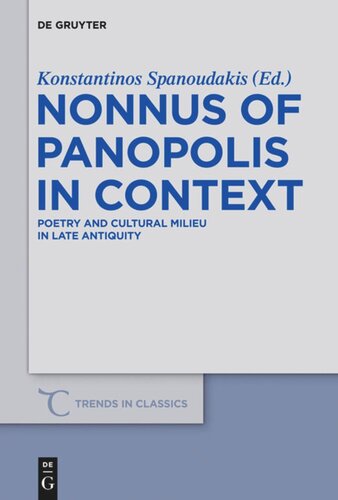

Most ebook files are in PDF format, so you can easily read them using various software such as Foxit Reader or directly on the Google Chrome browser.
Some ebook files are released by publishers in other formats such as .awz, .mobi, .epub, .fb2, etc. You may need to install specific software to read these formats on mobile/PC, such as Calibre.
Please read the tutorial at this link: https://ebookbell.com/faq
We offer FREE conversion to the popular formats you request; however, this may take some time. Therefore, right after payment, please email us, and we will try to provide the service as quickly as possible.
For some exceptional file formats or broken links (if any), please refrain from opening any disputes. Instead, email us first, and we will try to assist within a maximum of 6 hours.
EbookBell Team

4.8
64 reviewsNonnus of Panopolis (fifth century CE) composed two poems once thought to be incompatible: the Dionysiaca, a mythological long epic with a marked interest in astrology, the occult, the paradox and not least the beauty of the female body, and a pious and sublime Paraphrase of the Gospel of St John. Little is known about the man, to whom sundry identities have been attached. The longer work has been misrepresented as a degenerate poem or as a mythological handbook. The Christian poem has been neglected or undervalued. Yet, Nonnus accomplished an ambitious plan, in two parts, aiming at representing world-history. This volume consists mainly of the Proceedings of the First International Conference on Nonnus held in Rethymno, Crete in May 2011. With twentyfour essays, an international team of specialists place Nonnus firmly in his time's context. After an authoritative Introduction by Pierre Chuvin, chapters on Nonnus and the literary past, the visual arts, Late Antique paideia, Christianity and his immediate and long-range afterlife (to modern times) offer a wide-ranging and innovative insight into the man and his world. The volume moves on beyond stereotypes to inaugurate a new era of research for Nonnus and Late Antique poetics on the whole.